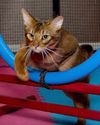Essayer OR - Gratuit
Alternative Arthritis Treatments for Cats
Cat Talk
|October 2024
Just like humans, cats can experience arthritis. About 90% of cats over the age of 10 years experience osteoarthritis (OA) in at least one joint.1 It is a complex condition involving inflammation and degeneration of one or more joints and is sometimes referred to as degenerative joint disease (DJD). Cats with OA experience pain and inflammation in various joints that interfere with daily activities.

Causes of Arthritis
Unfortunately, there is no single cause; many factors can contribute to its development. Among these are: a cat’s skeletal structure, obesity, abnormal joint development, past injuries and orthopedic surgery. Nutritional history can also play a role. While most cats with OA experience a combination of these factors as their OA develops and progresses, just “getting old” is NOT a cause of OA.
Signs of Arthritis
Cats with arthritis will not exhibit the same signs, nor will they exhibit all the signs at the same time. Cats with arthritis don’t usually limp the way people with arthritis do, nor do they vocalize their pain as dog might.
The most commons signs of arthritis are:
• Difficulty getting up and down
• Walking stiffly. Lameness in one or more legs
• Reluctance to go up or down steps, jump up or down, and/or play
• Stiff, swollen, or sore joints
• Reluctance to be touched on some parts of the body
• Unexpected aggression toward other cats or humans
• Hiding more than usual
• Inappropriate elimination (from pain, or if a cat has difficulty getting in and out of the litter box)
• Poor coat condition (because self-grooming becomes difficult)
Even if cats know they are loved, they will still instinctively conceal pain. In the wild, small animals like cats are prey for larger carnivores; concealing pain is a survival instinct. Even as pets, they still instinctively avoid advertising their vulnerabilities.
 Medical Treatments
Medical TreatmentsCette histoire est tirée de l'édition October 2024 de Cat Talk.
Abonnez-vous à Magzter GOLD pour accéder à des milliers d'histoires premium sélectionnées et à plus de 9 000 magazines et journaux.
Déjà abonné ? Se connecter
PLUS D'HISTOIRES DE Cat Talk

Cat Talk
Holiday Aromatics
Are They Naughty or Nice?
3 mins
December 2024

Cat Talk
Feline Photographers Part 2
Social media is rife with pictures of our pets, especially cats.
11 mins
December 2024

Cat Talk
Celebrating the Season With Our Cats
As this writer began work on this project to find holiday stories involving cats, she was amazed to find that there are ELEVEN religious holidays celebrated during December!
4 mins
December 2024

Cat Talk
How Cats Find Their Owners
A month after losing her beloved senior cat, a woman named Amin Diane was parked on a street at night, waiting for her friend.
5 mins
December 2024

Cat Talk
Remembering Willa Hawke
Retired CFA Judge Emeritus Willa Hawke passed away August 2, 2024 in Lake Kiowa, TX at the age of 88. She had been a judge for over 50 years before her retirement in 2016.
1 mins
December 2024

Cat Talk
UP CLOSE AND Purr-sonal
Thoughtful... Caring ... Giving ...Helpful... Committed.
4 mins
December 2024

Cat Talk
DON'T PUFF AROUND PUFF!
THE EFFECT OF SECONDHAND SMOKE ON CATS
5 mins
December 2024

Cat Talk
Fluffy Coats
AND HOW TO CARE FOR THEM
7 mins
December 2024

Cat Talk
Feline Agility?
I Thought Agility Was For Dogs!
7 mins
December 2024

Cat Talk
Come Fly With Me!
TIPS ON NAVIGATING AIRPORT SECURITY WITH YOUR CAT
4 mins
December 2024
Listen
Translate
Change font size

